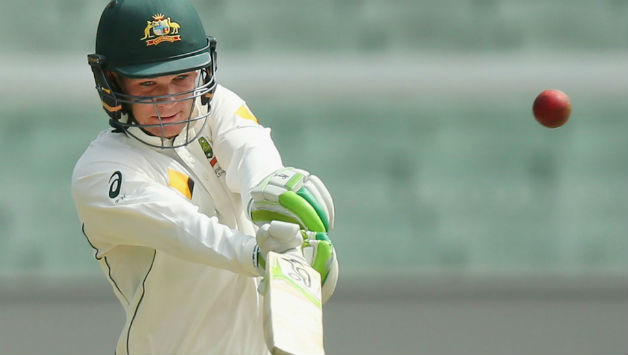
Devarchit Varma
Devarchit Varma is senior writer with CricketCountry. He can be followed on Twitter @Devarchit
Written by Devarchit Varma
Published: Dec 29, 2016, 07:11 AM (IST)
Edited: Dec 29, 2016, 11:24 AM (IST)


Australia continued to march towards a big first-innings total in the second Test at Melbourne against Pakistan, reaching 395 for 4 at lunch on the fourth day. Usman Khawaja missed out his century by a narrow margin, but half-centuries from Peter Handscomb and Steven Smith kept the Australians ahead of Pakistan in the contest, who now trail by only 48 runs. The visitors had declared their first innings at 443 for 9, with Azhar Ali smashing a splendid first double-century by a Pakistani batsman at Melbourne Cricket Ground (MCG). Azhar’s 205 not out bolstered Pakistan’s chances in the game, but Australia’s brisk-scoring rate has negated their advantage. At lunch, Smith was batting on 61 not out, accompanied by Nic Maddinson on an unbeaten 7.
So far in their innings, Australian batsmen have smacked 46 boundaries. The run-rate has remained around 4.5 an over, which underlines a positive comeback for the hosts, who had conceded close to 450 in the first innings. Australian batsmen have scored aggressively throughout, with David Warner setting the tone on the third day. Warner scored 144 with 17 boundaries and 1 six off a mere 143 deliveries, and along with Khawaja, he added 198 runs on Day Three to put Australia right back on the top. Australia are expected to take lead in the first innings during the afternoon session.
With their backs firmly pressed against the wall in order to keep the series alive, Pakistan were required to make amends and make early inroads into the Australian line-up. Wahab Riaz, who over-stepped as many as ten times during the third day, began positively, rather aggressively along with Mohammad Aamer. The two pacers gave nothing to Australians to score off; their lines were tight and pace was threatening enough to find edges.
With Pakistani bowlers in a good rhythm, Australia had to be watchful. The final ball of the third over got the first runs, when Khawaja pushed one off the pads to collect two runs. However, those were the only runs Khawaja could add to his overnight total of 95, as he chased one outside off, awarding a wicket to Wahab with a thick edge carrying through to the wicketkeeper.
Khawaja had no one else but himself to blame for missing out on a century. He faced 165 balls and struck 13 boundaries to get to 97. Khawaja will be disappointed, as in the second innings of the Brisbane Test he was dismissed for 74.
Live cricket scorecard: Australia vs Pakistan, 2nd Test at Melbourne
Peter Handscomb became the first Australian since Michael Bevan in 1994 to hit scores in excess of 50 in his first three Tests. Handscomb once again used the depth of the crease to maximum advantage, and he stroked his way to a fine 54 off 90 balls, with the help of 8 boundaries. He fell to Sohail Khan in the 86th over when Handscomb failed to keep a drive on the ground, playing the stroke straight to point.
At the other end, Smith went about his job with usual calmness. Australia had resumed the fourth day’s play trailing by 165 runs. At lunch, they need another 48 runs to take first-innings lead and knowing that not much batting is left in Australian ranks, especially keeping in mind the current form of Nic Maddinson and Matthew Wade, his presence would be necessary for the hosts to extend their lead into a significant one.
In their first innings, Pakistan batted for 126.3 overs and hit 43 boundaries. So far in their innings of 92 overs, Australian batsmen have already hit 46.
Brief scores:
Pakistan 443 for 9 decl. (Azhar Ali 205*, Asad Shafiq 50, Sohail Khan 65; Josh Hazlewood 3 for 50, Jackson Bird 3 for 113) lead Australia 395 for 4 (David Warner 144, Usman Khawaja 97, Steven Smith 61*, Peter Handscomb 54; Wahab Riaz 1 for 121) by 48 runs
This website uses cookies so that we can provide you with the best user experience possible. Cookie information is stored in your browser and performs functions such as recognising you when you return to our website and helping our team to understand which sections of the website you find most interesting and useful.
Strictly Necessary Cookie should be enabled at all times so that we can save your preferences for cookie settings.
If you disable this cookie, we will not be able to save your preferences. This means that every time you visit this website you will need to enable or disable cookies again.
